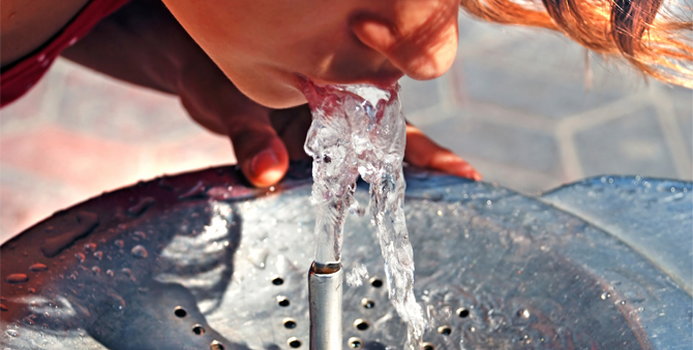For many people, traveling is a huge part of their lives. Traveling to new destinations, trying new foods and having new adventures is a large draw that sends millions of people to different countries around the world. Staying healthy while abroad is much like staying healthy at home, but with greater challenges. Remaining active, getting enough rest and eating healthy foods is essential, but often requires adaptations for the changing environments. When it comes to eating healthy, some of the biggest challenges include limited availability of healthy choices and food safety concerns.
Some countries are not as developed as others, lacking basic access to safe water, toilets and soap. Visiting these countries can have additional risks and staying healthy to enjoy the most of your trip is a priority. Nobody wants to miss out on activities due to upset stomach, diarrhea or fever! So before you decide to eat street food or drink the glass of water you are served at your table, take a few minutes to consider your risks and how you can best mitigate them.
One of the first things you should do to learn about the hazards of your travel destination is to do a little online research of the area. Check on the Center for Disease Control's website for specific information. They have country specific information as well as general recommendations for staying healthy while traveling.
Bacteria Basics
To avoid foodborne illnesses, also called food poisoning, make sure you know the basics of proper food cooking and handling practices. Bacteria grows between 40 and 140 degrees Fahrenheit and can multiply to trillions of new bacteria is just a day when left in the right conditions. Bacteria live everywhere: on your skin, the bottoms of shoes and purse, under nails, and on surfaces. The most common contaminated food sources are foods of animal origin. Although less common, harmful bacteria can be found on fresh produce. Produce can be contaminated from handling practices or by contaminated water or soil or residue. Bacteria thrive in moist and warm conditions. Eating bacteria-contaminated food or water sources while you are traveling is one of the most common problems you might encounter, but you can also get sick from parasites and viruses too.
Drinking contaminated water can cause serious illness. Bacteria in your drinking water like E. coli, cholera and salmonella, or protozoans (i.e. giardia and cryptosporidium) and viruses (i.e. hepatitis A, polio and rotavirus) can lead to debilitating illness. In some areas, the water shouldn't even be used to brush your teeth and you need to be careful to not drink any in the shower.
Things to not drink
- Avoid tap water!
- Ice made from tap water
- Fountain drinks that use tap water -- buy bottled soda instead
- Juices or dairy-based drinks made with tap water or that are unpasteurized
Things to Drink
- Hot coffee and tea is usually a safe choice, but be careful of added milk
- Water that has been treated, boiled and/or filtered
- Bottled water, soda, beer, wine and sports drinks are safer choices
- Ice made from treated water -- be sure to ask!
The general rule for eating healthy is wash it (under the right conditions!), peel it and cook it thoroughly. More specific guidelines for eating healthy while traveling include:
Foods to Avoid
- Buffets or foods that are held at questionable temperatures for long periods of time
- Undercooked eggs
- Undercooked fish or meats (medium-well or well-done to decrease the risk of contamination)
- Fruits and vegetables that have not been washed or that you do not peel
- Condiments that are not pre-packaged or are made with fresh ingredients (like salsa or unsealed mayonnaise)
- Salads and any vegetables that are not cooked
- Dairy products that are locally made and unpasteurized
- Popsicles or flavored ice (although freezing kills some bacteria, for many it just slows the growth and the risk is still there)
- Limit street food cooked in unsanitary conditions or held for long periods
- Cold meat and cheese platters
Foods to Eat
- Food that is made-to-order and served hot
- Hard Boiled eggs
- Fruits and vegetables that you are able to wash in clean water and peel
- Pasteurized dairy products
- Nuts or shelled foods
IF you do get sick, adequate fluid intake is essential to preventing dehydration. Consider packing oral rehydration salts (ORS) in case you do get sick. Over-the-counter medicine will help manage the symptoms of most foodborne illnesses.
Use your common sense when traveling and reduce risks as best you can. And always remember that washing your hands frequently in clean water is one of the best and easiest ways to decrease your risks and stay healthy!

Emily DeLacey MS, RD is a Registered Dietitian and currently working in Jamaica as a HIV/ AIDS Prevention Specialist. She attended Central Washington University for her Bachelor's Degree in Science and Dietetics and continued on after her internship to Kent State University for her Master's Degree in Science and Nutrition, with a focus on public health and advocacy. She served as a U.S. Peace Corps Volunteer in Malawi 2012-2014 working as a Community Health Advisor in a rural village, immersing in the joys of life without electricity or running water. She has been to 20+ countries and 47 of the 50 states in the US. Traveling, adventuring and experiencing new cultures has made her a passionate advocate for the equality of nutrition and wellness for all people.



